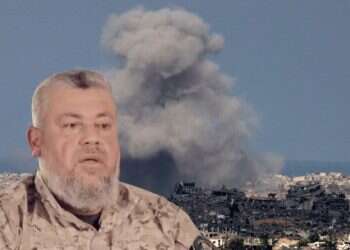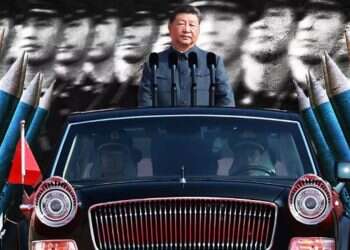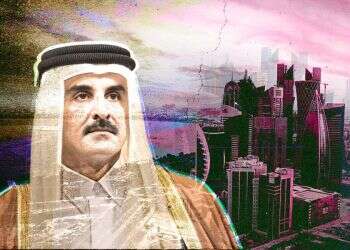George Simion is one of the most famous names in Romanian politics at the moment. The 36-year-old politician founded his right-wing Alliance for the Union of Romanians faction a mere three and a half years ago but is already considered a major threat ahead of the elections for the presidency, the Chamber of Deputies, the municipal authorities and the European Parliament, to be held in 2024.
Follow Israel Hayom on Facebook, Twitter, and Instagram
In the previous general elections, which were held about a year and a half after the establishment of the AUR, the party received a tenth of all the parliament seats, becoming the fourth largest faction.
Video: PM Netanyahu meets with Romania's prime minister (2019) / Credit: GPO
Romania suffers from chronic political instability having had 11 governments in the past decade, mainly due to a divided political map, affairs, scandals as well as a difficult economic situation. The strongest faction in the country is still the Social Democratic Party, a member of the National Liberals, the second largest in the parliament. The rotation between the heads of the parties, which was postponed due to the waves of protest and strikes by the country's teachers, took place this week, and despite the withdrawal of one of the coalition parties, the new government won the confidence of 290 out of 465 members of parliament.
The four basic tenets of the AUR are family, nation, Christianity, and freedom. Behind Simion's desk, a window was designed as a map of Greater Romania, which also includes Moldova, and indeed the faction advocates for the unification of the two nations as used to be under the Kingdom of Romania. This, among others, is why Simion and the AUR are claimed by their opponents to be neo-fascist and pro-Russian.
The AUR defines itself as patriotic and Christian-democratic, seeks to protect the rights of Romanians, values religion, and opposes "gender ideology" and abortion.
The faction is currently trying to be accepted into the ranks of the European Conservatives and Reformists Party, a faction of right-wing European parties currently headed by the Prime Minister of Italy Giorgia Meloni, and since the Romanian media is mostly mobilized on the side of the political establishment, the party has made social networks its main means of conveying messages.
Simion, "a guy from the hood" who has cultivated an image of a sincere and honest politician, lives with his wife in a modest apartment in Bucharest and reportedly donates 90% of his salary every month to charities.
In local politics, which is seen as corrupt to the core, Simion is a refreshing change. He may run for the presidency or set his eyes on the premiership.
Romania's loss
Simion's political opponents say he and his party are ideologically similar to the antisemitic regime of the dictator former Prime Minister of Romania Ion Antonescu and his allies, the so-called "legionaries" from the Iron Guard that was responsible for the death of Romanian Jews during the Holocaust. About 400,000 Romanian Jews were murdered by Nazi collaborators in Romania and in areas under its control.
It took Romania a long time to accept responsibility for its crimes against the Jews, which also continued under the communist regime. Despite the accusations against Simion, he has no history of antisemitic remarks and makes sure to remove from the ranks of his party any elected official with extremist behavior. In the past, he visited Israel privately and hopes to make an official visit soon.
Jerusalem is still unsure about Simion and the AUR, as there are other sovereign right-wing parties in Europe that are getting stronger politically. In an exclusive interview with Israel Hayom, Simion sought to clarify his positions regarding Jews, the Holocaust, and Israel.
Q: Israelis of Romanian origin are often encouraged to get their Romanian citizenship. And you and your party have called on the return of all Romanians to the country. Do you consider these Israelis Romanians as well?
"Of course. There were times in our history when we were a large and respected country in the international arena. Many Jews of Romanian origin helped us win this recognition. For example, Ana Aslan (a biologist and physicist) who invented the Gerovital (anti-aging drug), which helps a lot for medical tourism in Romania. The many Jews who left Romania in the 1960s and 1970s are, in my opinion, a great loss for us. Now we barely have 10,000-20,000 Jews living here. We had excellent ties. Minorities can help us become a more diverse and richer society."
Q: Do you mean religious minorities? abo
"As well as national ones. We have Serbs, Hungarians, Ukrainians, and Russians who fled from the tsar but say they are Tatars or Turks. It's good that we are not alone. Every people and nation has its characteristics. At a time when we were a large country, between the two world wars, you – the Jews – helped us. We recently celebrated in the Romanian parliament 75 years since the recognition of the State of Israel and the establishment of diplomatic tiwa between Romania and Israel in the presence of the Speaker of the Knesset" Amir Ohana.
Interestingly, Romania was the only communist country that did not sever ties with Israel after the 1967 Six-Day War.
Today "there's a problem in the ties between us, it is related to the memory of the Holocaust. This issue has been hijacked by a group of people who are looking to make gains. These people are causing a lot of damage because we are a party that will most likely be a member of the government in Romania, and we can be friends with Israel from a position of power. I am sure, from everything I see in the international arena, that Israel needs friends. In my vision of the future, I am interested in properly using the 800,000 Israeli citizens of Romanian origin. This is an opportunity we are not taking advantage of."
Holocaust should not be part of political games
Simion does not take kindly to the fact that some in Romania demand that Jewish history and the Holocaust be taught in all high schools as separate compulsory subjects – such as language, history, and geography - and even passed a law on the matter.
"True, there are a small number of lunatics here who claim that the Holocaust did not happen," he said. "But besides them, no one in Romania denies that this is one of the most terrible events in the history of mankind.
"We said that it is desirable to teach the subject as part of Romanian history classes because it is part of our history and that is how it should be taught. They have pushed the matter too far, so that there will be separate classes on Jewish history, and I don't think that is good in the long run.
"Today we do not have antisemitic feelings in our society, and we have to fight so that there are no such feelings. Israel's enemies spread antisemitism by claiming that you are the rulers of the world. When you go to school and do not learn about the history of Romania, but you have mandatory lessons about the history of the Jews, it may backfire. Several groups in Romania are pushing this agenda for personal gain, and we have heard accusations against our party. Holocaust memory should not be part of the political game under any circumstances."
Q: Do you recognize the responsibility of the Romanian state for the crimes committed against Jews in World War II?
"No one is denying it. This was the Romanian state, even if it was led by a dictator."
Q: There were pogroms and anti-Jewish laws even before the time of Antonescu, as early as 1938.
"Indeed, there was antisemitic legislation carried out by King Carol II. He was a dictator, Antonescu was a dictator, [former President of Romania Nicolae] Ceausescu was a dictator. We lived under several dictatorships. There were then ethnic problems and many antisemitic attitudes in our society. Fortunately, today there are no such attitudes, and we need to find the right path to prevent their reemergence."
Q: Those who admire war criminals like Antonescu and other dictators are not allowed to join your party?
"There are admirers in Romania of Ceausescu, of Antonescu, of Zelea Codreanu (the founder of the Iron Guard). I do not admire any of them. But if we try to dictate to people how to think and conduct a witch hunt, we will revive the past. Our party was founded in 2019, on Romania's national holiday. We are interested in the future, not in a witch hunt."
Q: But you yourself have explicitly stated that Antonescu was a war criminal.
"Yes, according to an ethical and legal definition."
Q: Laws are not necessarily always enforced in Romania, which is the responsibility of the government. If you end up in the government, will you implement the laws against the veneration of war criminals or against naming streets and memorial sites after them?
"After 2001, no more streets or sites bear Antonescu's name. Maybe you can find somewhere a memorial plaque with his name from those days, but the issue is quite closed. The law must be enforced in all areas of Romania, but it is important not to abuse the issue because it will lead to antisemitism that we are not interested in. There are parts of the Romanian population that look favorably on Antonescu, Ceausescu, and other dictators. Not necessarily for antisemitic reasons but because they were the rulers, and some people believe that under their leadership Romania was better off. So we have to be careful not to provoke these feelings.
"I regret that there are no Jews here in large numbers. Romanians could not leave the country under the communist regime. Had they been able to, they would have left and paid money to do it."
Q: Is your party willing to adopt the IHRA definition of antisemitism?
"I have not yet read this document. I understand that it also refers to certain negative attitudes towards the State of Israel. We recognize Israel and we can be its official partner. You can count on our friendship with Israel if correct relations exist between the two sides."
Q: Right behind you are the flags of Romania and the European Union. We know that there are Romanian minorities in neighboring countries that are members of the EU. Are you thinking about changing borders within the EU?
"We respect all international treaties. The only country with which we can change the border is Moldova. Both sides are interested in it. The last clause of the Détente agreements adopted in Helsinki in 1975 stated that if a country wants to unite with an existing country or separate from an existing country, it can be done by agreement of both sides. We want minority rights to be respected everywhere. For example, in Ukraine – half a million Romanians live there.
"We are a model for respecting the rights of minorities. We have Jews, Slovaks, Hungarians and gypsies in the parliament. There are schools for Serbs and Ukrainians. They have their own churches, which receive government support. We want these opportunities to be given to Romanians who live in neighboring countries, as well as in Italy, France or Spain – their own schools and churches, the right to use their own language."
Q: Regarding Moldova, if Russia invades it, will it be an incentive for the union between Romania and Moldova?
"Assuming that's what the citizens of Moldova want. Maybe some of them, who still think of the Russian empire, will change their minds when they see these criminals in action. These are criminals. We'll see what happens. It's hard to predict public opinion."
Q: There's also fears that Russia could expand its war. Do you think Romania might be a target?
"We are members of NATO. We don't think Russia, which is weak now, will attack a NATO member. We must promote peace by all means."
Q: And if the war does expand, is Romania ready?
"NATO is the largest and most powerful military alliance, and I'm sure it will have no problem dealing with such a scenario, which I don't think will happen."
Q: And with regard to your party, how would you define it?
"A patriotic party that remembers the words of Donald Trump, who said that the fight is now between globalists and patriots. We are patriots."
Q: It's not often these days that you hear someone quoting the former US president.
"It might be uncommon, but his words were true. My feeling is that we are fighting the same adversaries – the Left and the extreme Left, who are trying to promote an agenda and abolish the idea of nations. Trump made some bad statements and behaved badly at times, but he also had the right statements. I will always prefer Trump over Biden."




